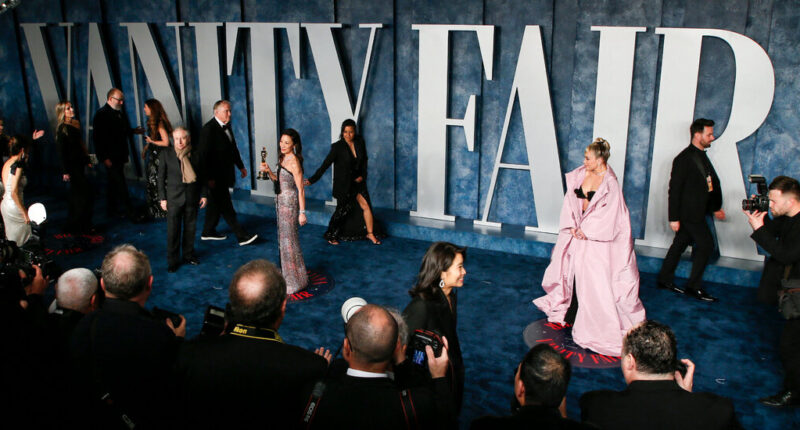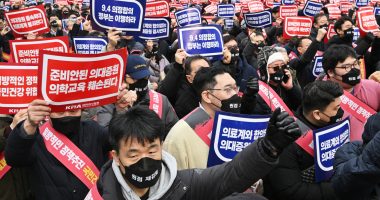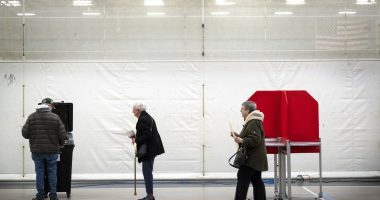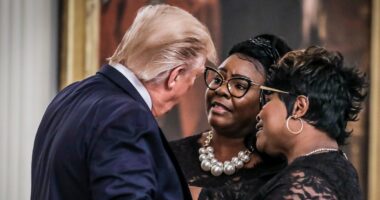
BEVERLY HILLS, Calif. — On Sunday night at 10:30, the tented area along North Santa Monica Boulevard resembled an airport security line in which nearly every woman was wearing a slinky bedazzled gown by Versace, Dolce & Gabbana or Balenciaga and every man was in a tuxedo by Tom Ford or Giorgio Armani.
As the actress Andie MacDowell waited patiently outside the Wallis Annenberg Center for the Performing Arts in Beverly Hills, someone behind her asked whether she had gone to the Academy Awards ceremony earlier that evening. Which was funny, given that Ms. MacDowell had presented the award for best production design from the Dolby Theater stage.
In front of Ms. MacDowell, in a simple black tuxedo, was Hugh Grant, her co-star in the 1994 rom-com “Four Weddings and Funeral,” who had presented the award with her.
Also in line: the British actor Lucien Laviscount, a former contestant on “Celebrity Big Brother.” He wore a sheer black sleeveless thing that looked like the kind of tuxedo you might see at Chippendales. This one, he said, was designed by Dolce & Gabbana.
Twenty-nine years into its existence, the Vanity Fair Oscar party had competition for the weekend’s most exclusive ticket, but it was still the biggest social event in town in terms of square footage, security and star wattage.
Along with the nominees and presenters, the gathering includes moguls, models, directors, designers, music producers, reality show personalities, executives, investors and luxury brand consultants.
Some have reasonable hopes of one day making it to the Dolby stage themselves. Others merely had the connections necessary to get into the room.
They come because, even in a fragmented, streaming era, the town’s birthday remains the Oscars. They come to gawk. And they come because, even if this is “not their year,” proximity is its own form of validation.
Particularly when five-figure loaner outfits, six-figure loaner jewelry and the promise of soft amber lighting are added to the mix, allowing the guests a chance to parade in front of the Hollywood gatekeepers whose approval is a principal source of life.
More on the 95th Academy Awards
- ‘Everything Everywhere All at Once’ Wins Big: The head-twisting, sex toy-brandishing, TikTok-era film won best picture — along with six other Oscars, including acting awards for Michelle Yeoh, Ke Huy Quan and Jamie Lee Curtis.
- The Show: An Oscars broadcast that’s become a shrink-wrapped, anodyne exercise stuck safely to the script, our television critic writes.
- Oscar Fashion: Rihanna’s belly, Florence Pugh’s shorts and Cate Blanchett’s archival velvet brought new relevance to awards show dressing, our fashion critic says.
- Governor’s Ball: At the academy’s big post-Oscars party, stars and filmmakers celebrated with dancing, drinks and prime rib. Here’s a look inside the festivities.
Because, really, what purpose do facial fillers and Ozempic serve, if not to show Bryan Lourd of Creative Artists Agency or David Zaslav, the newly minted head of Warner Bros. Discovery, that you’ve still got it and remain bankable?
As Ms. MacDowell made her way into the main room, Ava DuVernay wafted by in a billowing dress with metallic accents. A little ways off, Steven Spielberg stood with his wife, the actress and artist Kate Capshaw. The director seemed happy to see Hailee Steinfeld, a star of the AppleTV+ series “Dickinson” who happens to be the niece of someone Mr. Spielberg knows.
“Jake Steinfeld,” Mr. Spielberg said, smiling. “He used to work me out. In the ’80s. Body by Jake.”
As in a game of musical chairs, Ms. Steinfeld stepped away, and he found himself in conversation with Kerry Washington. A moment later, Mr. Spielberg was gone, and Ms. Washington was chatting with the producer Ryan Murphy.
Past the bar, in the center of the room, was Kevin Hart, the comedian who withdrew as the host of the 2019 Oscars after he was criticized for past homophobic comments on social media. Was he hoping to soft-pitch his way back into the Academy’s good graces?
“I’m just enjoying a night out,” said Mr. Hart, who wore a black Alexander McQueen suit and a Patek Philippe watch that can be purchased for no less than a year’s tuition at a top-tier university.
A DJ played Michael Jackson’s “Human Nature.”
Jeff Bezos stood nearby with his girlfriend, Lauren Sánchez, who did a jig. The couple had enjoyed much of what Oscars week had to offer, having attended the Versace runway show on Thursday, after which came meals at the Sunset Tower, the Chanel’s night before Oscars soiree dinner on Saturday, and in just moments — the next stop on the Bezos midlife express, the private post-Oscars party hosted by Madonna and her manager, Guy Oseary.
Sharon Stone walked in, hair slicked back, in a yellow caftan-like gown. The “Ozark” star Julia Garner was to her left. As Nelly’s “Hot in Herre” cut through the general din, Ms. Stone showed off some of the evening’s better dance moves.
Waiters served cocktails and In-N-Out burgers, a yearly Vanity Fair party tradition. The designers Donatella Versace and Jeremy Scott strolled by, along with a number of other fashion-world regulars — Gigi Hadid, Kendall Jenner, Emily Ratajkowski.
Heidi Klum arrived around 11:30 p.m. with her husband, the podcaster and musician Tom Kaulitz, and ran smack into her manager, Desiree Gruber.
Examining Ms. Klum’s chest in her sparkly blue and white beaded dress, which had come from Zuhair Murad, Ms. Gruber had one word: “Perky!”
The model Kaia Gerber passed by a moment later. Her dress was sparkly too. “Celine,” she said.
Out on the deck, away from the crowd, the model and actress Amber Valletta smoked a cigarette.
The singer Adam Levine was nearby, tattoos poking out from his black tuxedo. Like many of the tuxes on view Sunday night, his was paired with a black shirt that gave the outfit a Gothic edge, with a soupçon of Rodeo Drive. And there was the D.J. and producer Diplo, who looked a bit like a campy Coachella cowboy in a bedazzled black tuxedo and pants that flared out.
Cate Blanchett arrived in the blue and black Dior gown she had worn to the ceremony. Photographers rushed in to get their shots of the “Tár” star. A member of Ms. Blanchett’s team rushed to stop them, saying, “We’re good,” and throwing up a quick stop-sign hand.
Around midnight, the winners trickled into the pavilion.
Among the first was Ke Huy Quan, who had earned the Academy Award for best supporting actor for his role in “Everything Everywhere All At Once.” He headed toward the deck, where Riz Ahmed, the British actor and musician, fan-boyed him, talking about his love of Mr. Quan’s work dating back to “The Goonies,” which the actor had co-starred in at age 13.
Sarah Polley, the actress, writer, and director, arrived shortly afterward. She wore a blue tuxedo and sensible black glasses. In one hand she carried the trophy she had received in the best adapted screenplay category for “Women Talking.”
Ms. Polley said she could not quite fathom why it had taken her nearly five hours to get to the party from the ceremony. Perhaps it was the press room, where she had faced a phalanx of interviews. There had also been a stop at the Governor’s Ball, the Academy’s official after-party.
“It’s all sort of a haze,” Ms. Polley said, as a dozen or so guests raised their phones in violation of the party’s no cameras or recording devices policy.
The reason for the hullabaloo was that Michelle Yeoh had now entered the room. Earlier, she had taken the best actress prize for her role in “Everything Everywhere All At Once,” which made her the first woman of color to win in that category since 2002, when Halle Berry was honored for “Monster’s Ball.”
On one side of Ms. Yeoh, who wore a Giorgio Armani Privé gown, was a small team of handlers. On the other, holding her statue, was Ms. Yeoh’s partner, Jean Todt, a racecar executive. Radhika Jones, Vanity Fair’s editor in chief, offered her congratulations.
Then, Ms. Yeoh and her posse moved to the back of the room, whereupon she was greeted by her “Everything Everywhere” co-star Stephanie Hsu.
“We’re so proud,” Ms. Hsu was saying. “I want to dance.”
And so — for at least a few bars of the Elton John and Dua Lipa duet “Cold Heart”— she and Ms. Yeoh did, as gawkers snapped away and Donald Glover, in a gray tuxedo with no shirt underneath, munched his way through an In-N-Out burger.
Around 1 a.m., the crowd thinned out.
The actress Allison Williams and her fiancé, fellow thespian Alexander Dreymon, headed off to Madonna’s — the same place Mr. Bezos, Ms. Sanchez, Ms. Stone, and the comedian Billy Eichner had gone. Others were going to a party thrown by Jay-Z and Beyoncé.
A waitress was down to her last In-N-Out burger.
She approached Brendan Fraser, who stood in the center of the room holding the lead actor Oscar he had won for his role in “The Whale.”
“I have a proposal,” the waitress said, pointing first to his statue and then to the burger. “I’ll trade you this for that.”
Mr. Fraser gave a smile as he declined the proposal. For a moment he seemed to consider taking the burger, only to decide against that, too.
He was asked where he planned to put his not-so-little gold man.
“Probably next to my fourth-grade bowling trophy,” he said.
Source: | This article originally belongs to Nytimes.com









